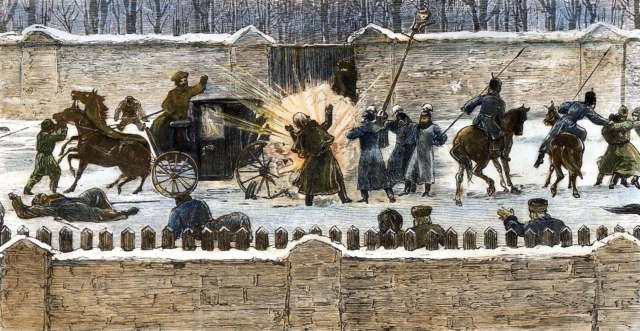On March 13th, 1881, Czar Alexander II of the Russian Empire, was assassinated in St. Petersburg when a bomb was thrown into his horse carriage. Alexander’s death would mark the end of a period of relative calm relations between Jewish residents of the empire and their gentile neighbors, due to many of his liberal policies, and instead marked the beginning of decades of pogroms promoted by the empire which would enhance the Zionist movement’s cause. A year after the Czar’s assassination, the first Zionist migration, or “Aliyah” to the land of Israel would begin.
The systematic and random assault against Jewish homes, businesses, and synagogues throughout the empire began just a month after the assassination, putting Zionism under the spotlight in the European-Jewish world. The new Czar, Alexander III, blamed his father’s liberal policies for his own assassination and reversed many of those ideologically-based policies.
Pogrom came into frequent use as a term around 1881 after anti-Semitic violence erupted following the assassination of Czar Alexander II.
— G_OLD Man (@G_Old_M) March 24, 2022
Anti-Jewish groups claimed the government had approved reprisals against Jews. The first violence broke out in Yelizavetgrad, Ukraine
According to extensive research led by H.H Ben Sasson in 1976 into the cause of the pogroms in the late 19th and early 20th centuries, found that the Jews “have succeeded in exploiting the main body of the population, particularly the poor, hence arousing them to a protest, which has found distressing expression in acts of violence.”
In May 1882, the May Laws would be published by the new Czar, which further restricted Jews to live in the Pale of Settlement borders in the southern part of the Empire and prohibited Jews from living outside of larger cities and towns, owning property, leasing land, and operating their businesses on Sundays or other any other Christian holidays or holy days.
Today in 1881: After multiple attempts on his life, Czar Alexander II was successfully assassinated in St. Petersburg by a member of the “People’s Will” group. Alexander was succeeded by his son Alexander III and Alexander II’s assassins were put to death. https://t.co/D2H4xl94fq
— CEO of the Last Blockbuster (@Rihannas_Tongue) March 13, 2023
As a result of the new strict laws and pogroms, approximately 2.3 million Jews left Russia between 1881 and 1930 with the great majority coming to the United States, South Africa, and Australia. Many other Jews began to believe in Jewish self-defense and the concept of Jewish self-determination, Zionism in other words. This antisemitic rise in Russia led Jews to the conclusion that taking destiny into their own hands would be the only way they could protect themselves.
On this day in 1881, Czar Alexander II Is Assassinated
— Center for Israel Education (@israeleddotorg) March 13, 2019
Czar Alexander II, the leader of Russia, is assassinated in St. Petersburg when a bomb is thrown into his carriage. #Israel #history pic.twitter.com/oPTsRMUYkI
This attitude would be manifested in going to places where freedom was defined by law and practiced, along with building their own self-run settlement for guaranteeing those rights. The need for a Jewish state was further reinforced after a second wave of pogroms began in 1903 in the Russian Empire, and once final time as a result of the Holocaust, in which most of European Jewry was exterminated.


